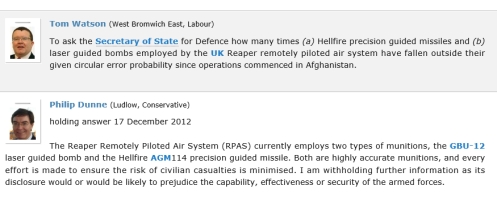|
“What is needed is a clear understanding of the issues involved so that informed decisions can be made.” The UK Approach to Unmanned Aircraft Systems, MoD 2011
In 2011 the MoD published its policy document on the use of armed unmanned aircraft systems, commonly known as drones. Exploring some of the moral, ethical and legal issues, the document accepted that there were serious issues with the use of armed drones, not least the growing autonomy and the fact that drones may simply “make war more likely.” While arguing that these concerns “must be” tempered” by the fact that drones “prevents the potential loss of aircrew lives,” the document went on to call for a proper debate on the issues and argued “what is needed is a clear understanding of the issues involved so that informed decisions can be made.”

In the two years since that document was written, the development and use of armed drones has continued to grow. There have now been more than 350 British drones strikes in Afghanistan and the number of British armed Reaper drones in service is about to double. Work to increase the autonomy of drones has also continued and earlier this week BAE Systems announced that its experimental autonomous combat drone, Taranis, will make its first flight sometime in the next couple of months.
Researchers, campaigners and MPs trying to get to grips with the implications of the growing use of drones however are being constantly frustrated by the secrecy surrounding their use. Despite the MoDs call for more informed debate, requests for information are being refused point-blank. The latest example was the refusal yesterday (17th Jan) of MoD Minister Philip Dunne to answer a question about the accuracy of British drone strikes from Tom Watson.

Drone strikes are constantly reported as being “pinpoint accurate” – the phrase has almost become a cliché – yet there are serious questions about the accuracy of Hellfire missiles.
The accuracy of each missile or bomb is measured by its ‘Circular Error Probability’ – that is the dimension of a circle of which 50% of missiles or bombs will hit. In the case of the GBU-12 laser guided bomb, the CEP is 6 metres in good weather – hardly ‘pinpoint’. The CEP of Hellfire is not public as far as we know.
While the MoD’s 2011 policy document on drones calls for better understanding , we know from a 2011 internal MoD briefing the MoD has also stressed the need for a “communication strategy” to win over public opinion in support of armed drones. When occasional piece of information are provided by the MoD we have to decide whether it is objective, or if it is primarily part of a ‘communication strategy’ meant to persuade us of the efficacy of using armed drones. And what’s worse, it appears that part of this persuasion strategy is simply not to reveal information that may put the use of drones in a bad light.
Over the past few years we have seen plenty of examples of the disastrous consequences when certain groups claim the privilege of exemption from scrutiny and accountability – bankers and their profligate ‘sub-prime’ loans policy, MPs and their expenses, being just two that jump to mind.
The MoD’s culture of secrecy and its refusal to accept scrutiny and public accountability is another disaster waiting to happen. It is not enough for the MoD to write about the need for public debate and understanding in policy documents on the one hand, and then refuse information to allow such understanding on the other. There is a great deal of public interest in the use of armed drones and the MoD must release information that would allow such debate and understanding to happen.
To sign Drone Campaign Network’s petition calling for an end to secrecy surrounding UK use of drones click here
|